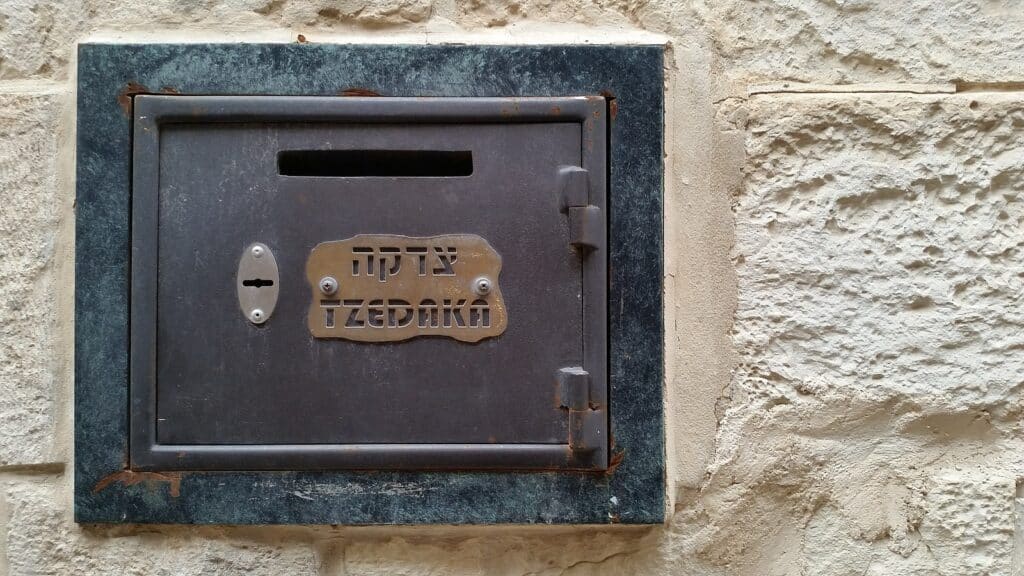
If you’re dealing with anxiety, you’re certainly not alone. A 2018 study of 1,000 young people aged 18-24 found that 42% had been diagnosed with a mental health issue, primarily anxiety disorders. Furthermore, 85% said that they worried about the future.
While many are familiar with psychological methods for managing anxiety, did you know that Judaism offers powerful practices and insights for coping with anxiety, fear and worry?
The goal of these practices is not to get rid of anxiety, which is a natural response of the body to perceived threats.
Instead of suppressing our anxiety, the goal is to understand and befriend it so that we don’t get overwhelmed by it.
The following Jewish practices can create a sense of space around your anxiety triggers, enabling you to experience these challenging emotions without being dominated by them.
Read more: Self-care tips when the news gets too overwhelming
Why do we get anxious?
It’s a common refrain among Jewish grandmothers to tell their families not to worry. My friend’s Jewish grandmother used to tell her kids and grandkids, “Don’t feel anxious — I’m worrying enough for all of you!”
This reflects a deeper belief about anxiety’s perceived protective role. Even though we understand rationally that worrying doesn’t prevent bad things from happening, we still worry and feel anxious, perhaps as a way to feel shielded and have an illusion of control over the future.
Read more: Jewish wisdom for navigating this time of war
For many of us, anxiety has roots in actual trauma experienced by us personally, by our loved ones, or throughout our history. For Jews, who have endured numerous atrocities, a predisposition toward anxiety is understandable.
In today’s world, particularly as Israel fights a war against Hamas and antisemitism surges globally, there are many real and pressing fears. In this context, anxiety and worry can be seen as rational responses to our often irrational and chaotic world.
Anxiety and worry can be seen as rational responses to our often irrational and chaotic world.
However, living with persistent anxiety is debilitating and harmful. It does not help us to confront the very real challenges we face. Prolonged anxiety can lead to a range of physical and mental health issues, from panic attacks to depression and various physical ailments. While anxiety may be an instinctive attempt to ward off danger, it can ultimately leave us depleted and ill.
During the High Holidays of Rosh Hashanah and Yom Kippur, three key practices are highlighted that can significantly transform our relationship with anxiety: teshuvah (returning to one’s self or to God), tefilah (prayer or communion with the Divine), and tzedakah (acts of justice and righteousness).
How do these practices help in managing anxiety? Let’s delve into each one.
Practicing teshuvah through meditation

Teshuvah is commonly associated with repentance, but it literally means “return” — a return to oneself or the Divine. Teshuvah signifies coming home.
When we feel anxious and worried about the future, meditation can ground and connect us to the present. Meditation helps to ease our fears and reduce our hypervigilance, allowing us to meet challenges with greater composure and clarity.
At its core, meditation is an act of teshuvah — a gentle return from the world of our frantic thoughts to the world of our breath, body, and the present moment.
By shifting us from the sympathetic nervous system (fight, flight, freeze) to the parasympathetic nervous system (rest and recharge), meditation can help recharge us at the deepest levels.
At its core, meditation is an act of teshuvah — a gentle return from the world of our frantic thoughts to the world of our breath, body, and the present moment.
This concept is echoed in the Torah during the Israelites’ escape from slavery. Trapped between their pursuers and the Red Sea, they experience a collective panic attack.
Moses counsels them: “Don’t be afraid. Collect yourselves and see the salvation which the One will make for you today…the One will fight for you and you will be still.” (Shemot/Exodus 14:13-14)
This applies to us as well: In the face of fear, slow down. Ground yourself. Connect to your Source. From that place, new pathways to freedom emerge.
Just as the Israelites moved from the land of constriction to freedom, we can find a similar pathway when we pause, breathe, and find our stillness.
If you’ve never meditated before or want a refresher, check out Unpacked’s “Soulful Jewish Living” podcast or “Flourish Weekly” with Yael Shy.
Tefilah — journaling, prayer and community

Prayer has long been a fundamental method used by the Jewish community to alleviate anxiety. Our liturgy is rich with appeals for peace, encompassing everything from structured prayers to poems and songs.
Over the centuries, generations have been greatly supported and calmed by the act of prayer in the face of fear.
However, not everyone finds solace in traditional prayer. If you find yourself in that camp, there are less formal ways of practicing tefilah that don’t require a prayer book or a belief in a traditional concept God.
Rebbe Nachman of Brazlav, an 18th-century Hasidic rabbi, advocated for hitbodedut, which is a form of both prayer and meditation, translating to “seclusion.”
He encouraged his students to take time each day to walk into the woods alone and speak directly to the Divine, out loud, without stopping. This practice of expressing whatever lies in one’s heart can be a therapeutic release and unloading of fear and anxiety.
This practice of expressing whatever lies in one’s heart can be a therapeutic release and unloading of fear and anxiety.
You don’t need to journey into the woods to practice hitbodedut — journaling is another way to do this. Writing continuously for a set period of time allows you to pour out your fears and worries onto the page. Whether you are writing to the Divine, yourself, or the universe, studies show that journaling can alleviate symptoms of anxiety and depression.
Although hitbodedut is an individual practice, community is a vital aspect of Jewish prayer and tradition. Certain prayers, like the Kaddish said after a loved one’s passing, require a minyan, a group of 10 or more.

While personal practices like journaling and meditation are valuable tools for managing anxiety, communal healing is equally important. Sharing your worries within a supportive group can enhance the healing power of personal spiritual practices, offering a collective strength in dealing with anxiety.
Tzedakah — performing acts of kindness and righteousness

It may seem counterintuitive, but engaging in acts of kindness and justice can indeed help alleviate anxiety. If you have ever participated in a service project or a political campaign during a personal struggle, you have likely experienced the transformative impact of tzedakah.
A defining aspect of anxiety is its ability to isolate and create a sense of loneliness. Anxiety convinces us that we are in danger and that we face this danger alone.
This feeling of isolation persists even when our anxiety is about a group, such as worrying about the Jewish community. We may still feel cut off and separate in that anxiety from the larger world.
Tzedakah breaks through this isolation, reconnecting us with the broader world. It turns our fears and feelings of scarcity into opportunities for generosity and connection. In giving, we not only contribute to the world but also connect to the best within ourselves.
Tzedakah breaks through this isolation… It turns our fears and feelings of scarcity into opportunities for generosity and connection.
The Talmud shares a story about Rabbi Yochanan, famed for his healing abilities, who used to heal his sick friends.
However, when Rabbi Yochanan himself fell ill, he needed his friend’s help to recover. The story poses the question: Why couldn’t Rabbi Yochanan heal himself? The Talmud responds with, “A captive cannot free himself from prison.”
This story underscores that we all need help and support from others. During an anxious time, asking yourself, “How can I help someone right now?” and then acting on it can be profoundly healing. Serving others, even when we doubt our own strength, helps liberate both ourselves and others from the mental confines of anxiety and distress.
Explore this more through our “Soulful Jewish Living” podcast, “Responding with love”
Conclusion
To sum it up, the goal is not to get rid of your anxiety for good. In fact, in my experience, trying to eliminate anxiety only makes it stronger.
Rather, we can approach our anxiety with compassion, acknowledging its role as a protective mechanism without letting it monopolize the driver’s seat of our lives.
Through these ancient Jewish practices of teshuvah (meditation), tefilah (expressing our struggles), and tzedakah (engaging in acts of kindness), we can manage our anxiety more effectively.
These practices help us cultivate an expanded heart and resilience, allowing these worries to move through us without being overwhelmed by them. May we all move into that promised land of inner peace and strength together.
Originally Published Nov 14, 2023 03:32PM EST
